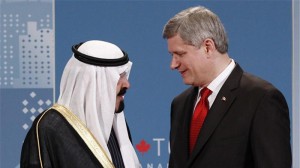Did the Canadian Government Bribe Saudi Officials to Obtain its Arms Deal?
In 1965, the United States and the UK were competing to sell war planes to Saudi Arabia. In order to get the lucrative contract, a « commission » had to be paid to members of the Saudi government.
The history of this colossal deal is recounted in a 1999 BBC documentary, The Mayfair Set. Four Stories about the Rise of Business and the Decline of Political Power. The first episode is titled Who Pays Wins.
The voice over images of the Queen of England and the Saudi King shaking hands and parading the streets of London to celebrate the historic deal explains: “December 1965, the Saudis announced they would buy the British planes. The bribes had worked. It was the biggest export dealing in Britain’s history and King Faizal came on a state visit to celebrate.“
Lord Caldecote, the director of the military aeroplanes manufacturer English Electric explained this blatant corruption in those words: paying a commission to Saudi officials in order to obtain a contract is a cultural thing, just like having many wives. In other words, the Saudis have different customs, and paying bribes is not a form of corruption. It is just the Saudi way of doing business.
Almost 50 years later, in 2014, Canada was just like the UK signing its biggest export contract of all time, a 15-year arms deal worth $15 billion. A Crown corporation, the Canadian Commercial Corporation, negotiated and signed the contract. The armoured vehicles will be supplied by General Dynamics, based in London Ontario.
Knowing the Saudi « customs », which have not evolved much for the past 50 years, Canadians have every right to wonder if the Canadian government offered bribes to the Saudi royal family in order to obtain the most important contract of its history.
In 1965, the sale of British war planes to Saudi Arabia was closed as a war was raging in Yemen, where Nasser’s Egypt backed the republican Yemenites who were fighting against the royalist forces supported by Saudi Arabia. The British planes were instrumental in driving the Egyptians out of Yemen, reasserting British control over important trade routes and protecting the Saudi influence in the region.
In 2014, while Canada was concluding its sale of armoured vehicles to the Saudi kingdom, a war broke out in Yemen involving, once more, Saudi Arabia.
On March 27 2015, the then Minister of Foreign Affairs Rob Nicholson voiced the support of the Canadian government for the U.S.-Saudi war in Yemen: “Canada supports the military action by Saudi Arabia and its Gulf Cooperation Council [GCC] partners and others to defend Saudi Arabia’s border and to protect Yemen’s recognized government at the request of the Yemeni president.”
In this history that repeats itself, one can seriously doubt the saying “other times, other customs.” The BBC documentary shows how the historic British deal in 1965 was “the beginning of the modern arms trade with the Middle East which has grown to dominate Britain’s economy.” The deal also gave rise to a blooming trade in other economic sectors, such as the construction business, opening a foreign market for British contractors.
According to the Globe and Mail:
Stephen Harper’s Conservative government made Saudi Arabia’s “emerging market” a priority as part of a foreign policy that focused on international trade and business. Ottawa made careful diplomatic overtures to Riyadh in the years before the 2014 arms deal, according to Saudi government documents made public last year by Wikileaks. The Saudis, in turn, made their own investments in Canada, such as donating hundreds of thousands of dollars to expand private Islamic schools in this country.
…
The Harper government lobbied hard for the arms deal, which was brokered by a federal Crown corporation, Canadian Commercial Corp. Canada beat French and German companies to get the contract. Ed Fast, then the federal trade minister, touted the deal in February, 2014, as a triumph for Canada’s economic diplomacy.” (The Saudi arms deal: What we’ve learned so far, and what could happen next, The Globe and Mail, May 24, 2016)
The Trudeau government, which initially declared it “didn’t approve” the contract and was simply refusing to terminate it, actually approved the remaining export permits. Thus, this deal was approved by both the Harper and Trudeau governments.
How did Canada beat the French and German companies? Did the Conservatives and the Liberals offer and/or secure bribes to Saudi officials in order to obtain this historic sale, thereby helping to maintain the influence of the most repressive, misogynist regime in the Middle East, which, by the way, is also responsible for training and financing terrorism which Canada is allegedly fighting at home and abroad?
An inquiry into this largely secret arms deal is needed.


